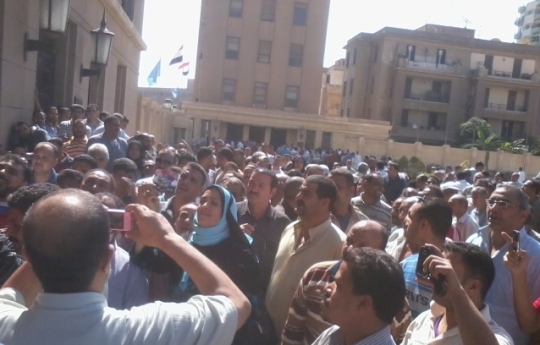Mahallah strike continues, cracks between management and striking workers appear

CAIRO, Oct. 27 (Aswat Masriya) - Attempts by heads of departments in the Misr Spinning and Weaving Company to convince striking workers to resume production failed as verbal altercations between them escalated on Tuesday.
The strike by 17,000 workers in Egypt’s largest public sector textile company, located in Mahallah city north of Cairo, has now entered its seventh day, as workers demand a 10 percent social bonus promised by President Abdel Fattah al-Sisi retroactively starting July.
The strike continues despite an ultimatum issued by Labor Minister Gamal Sorour on Monday evening.
Following meetings with officials in Gharbiya province where the company is located, Sorour said workers must resume production immediately so that within 48 hours Prime Minister Sherif Ismail would reach a "suitable agreement for them," warning that “legal measures will be taken against any attempts to obstruct work.”
Workers at the company were outraged by the minister's statements, saying that he is imposing a "condition" instead of resolving the crisis.
They were also angered because he did not meet with them or listen to their demands. The workers say they waited for him but he left the province without speaking to them.
The heads of departments, however, tried to resume production at the company's gas and power stations but failed to do so.
The ultimatum issued by the labour minister will expire on Wednesday night.
The 10 percent social bonus which workers are demanding seems to have been lost in translation as complex, at times conflicting laws were issued this year.
In September, Sisi issued a law granting the allowance to workers who do not succumb to the civil service law. On the same week, the Finance Ministry issued a set of regulations and legal specifications denying the allowance to some workers including the workers striking in Mahallah.
It seems that Sisi's law "was misinterpreted by the finance ministry," lawyer Alaa Abdel Tawab from the Egyptian Center for Social and Economic Rights previously told Aswat Masriya.
Workers at the industrial city of Mahallah have a long history of labour struggles. In 2008, they had planned a strike which pro-democracy activists supported through online campaigns to protest against the increased cost of living and low wages.
The workers were reportedly infiltrated by plainclothes policemen who intimidated them and the strike never took place. Yet, calls for solidarity led to street clashes with police and the birth of the April 6 Youth Movement, one of the groups that electrified the January 2011 uprising.
The current strike comes amid heightened urban consumer inflation which jumped to 9.2 percent in September, according to the official statistics agency CAPMAS.
It also comes during difficult economic times in Egypt, which is still reeling from the aftermath of years of social and economic turmoil following the uprising.









facebook comments